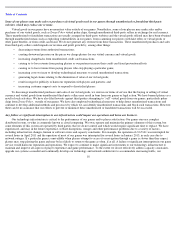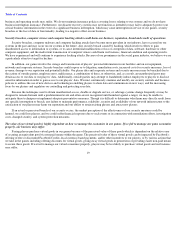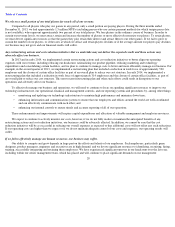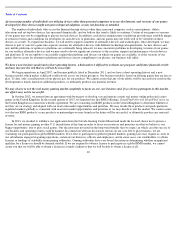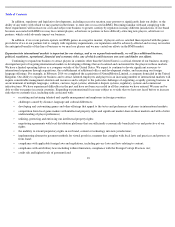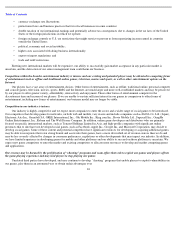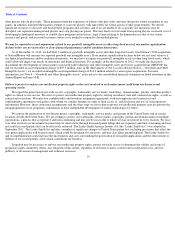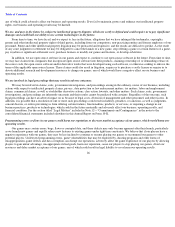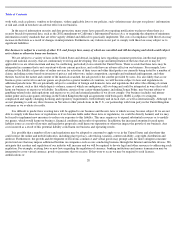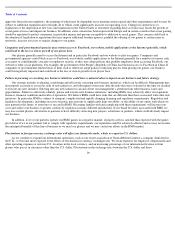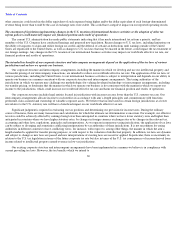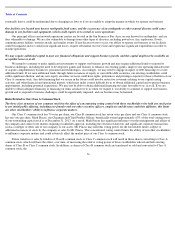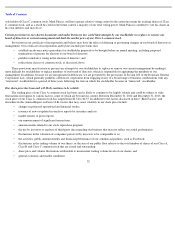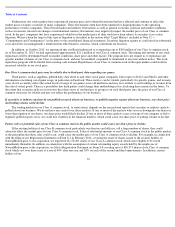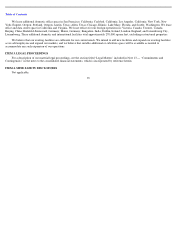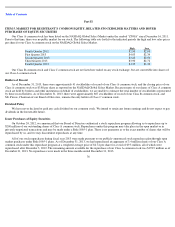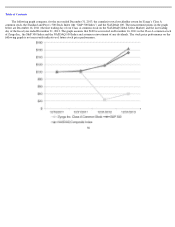Zynga 2013 Annual Report Download - page 32
Download and view the complete annual report
Please find page 32 of the 2013 Zynga annual report below. You can navigate through the pages in the report by either clicking on the pages listed below, or by using the keyword search tool below to find specific information within the annual report.
Table of Contents
work with, such as players, vendors or developers, violate applicable laws or our policies, such violations may also put our players’ information
at risk and could in turn have an adverse effect on our business.
In the area of information security and data protection, many states have passed laws requiring notification to players when there is a
security breach for personal data, such as the 2002 amendment to California’s Information Practices Act, or requiring the adoption of minimum
information security standards that are often vaguely defined and difficult to practically implement. The costs of compliance with these laws may
increase in the future as a result of changes in interpretation. Furthermore, any failure on our part to comply with these laws may subject us to
significant liabilities.
Our business is subject to a variety of other U.S. and foreign laws, many of which are unsettled and still developing and which could subject
us to claims or otherwise harm our business.
We are subject to a variety of laws in the United States and abroad, including laws regarding consumer protection, intellectual property,
export and national security, that are continuously evolving and developing. The scope and interpretation of the laws that are or may be
applicable to us are often uncertain and may be conflicting, particularly laws outside the United States. There is a risk that these laws may be
interpreted in a manner that is not consistent with our current practices, and could have an adverse effect on our business. For example, laws
relating to the liability of providers of online services for activities of their users and other third parties are currently being tested by a number of
claims, including actions based on invasion of privacy and other torts, unfair competition, copyright and trademark infringement, and other
theories based on the nature and content of the materials searched, the ads posted or the content provided by users. It is also likely that as our
business grows and evolves and our games are played in a greater number of countries, we will become subject to laws and regulations in
additional jurisdictions. We are potentially subject to a number of foreign and domestic laws and regulations that affect the offering of certain
types of content, such as that which depicts violence, many of which are ambiguous, still evolving and could be interpreted in ways that could
harm our business or expose us to liability. In addition, certain of our casino-themed games, including Zynga Poker, may become subject to
gambling-related rules and regulations and expose us to civil and criminal penalties if we do not comply. Our business includes real money
online poker and casino games offerings in the United Kingdom through an agreement with bwin.party. RMG is subject to stringent,
complicated and rapidly changing licensing and regulatory requirements, both federally and in each state, as well as internationally. Although we
are not planning to seek any direct licenses in Nevada or other jurisdictions in the U.S., our partnership with bwin.party in the United Kingdom
continues as we evaluate its results.
It is difficult to predict how existing laws will be applied to our business and the new laws to which we may become subject. If we are not
able to comply with these laws or regulations or if we become liable under these laws or regulations, we could be directly harmed, and we may
be forced to implement new measures to reduce our exposure to this liability. This may require us to expend substantial resources or to modify
our games, which would harm our business, financial condition and results of operations. In addition, the increased attention focused upon
liability issues as a result of lawsuits and legislative proposals could harm our reputation or otherwise impact the growth of our business. Any
costs incurred as a result of this potential liability could harm our business and operating results.
It is possible that a number of laws and regulations may be adopted or construed to apply to us in the United States and elsewhere that
could restrict the online and mobile industries, including player privacy, advertising, taxation, content suitability, copyright, distribution and
antitrust. Furthermore, the growth and development of electronic commerce and virtual goods may prompt calls for more stringent consumer
protection laws that may impose additional burdens on companies such as ours conducting business through the Internet and mobile devices. We
anticipate that scrutiny and regulation of our industry will increase and we will be required to devote legal and other resources to addressing such
regulation. For example, existing laws or new laws regarding the regulation of currency, banking institutions and money transmission may be
interpreted to cover virtual currency, goods or payments that we receive. If that were to occur we may be required to seek licenses,
authorizations or
28


